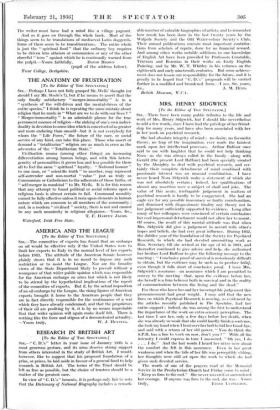THE ANATOMY OF FRUSTRATION
[To the Editor of THE SPECTATOR.]
SIR,—Perhaps I have not fully grasped Mr. Wells' thought (or should I say Mr. Steele's ?), but if he means to assert that the only finally satisfactory "'merger-immortality " is in a " synthesis of the will-drives and the mental-drives of the entire species," I think he is repeating the same mistake about religion that he made in " What are we to do with our lives ? " " Merger-immortality " is an admirable phrase for the true permanent essence of religion—the sinking of one's own indivi- duality in devotion to some idea which is conceived of as greater and more enduring than oneself—but it is not everybody for whom the " Life Force," the future of the race, or social service of any kind, can take this place. Those who assert or demand a " totalitarian " religion are as much in error as the advocates of the " Totalitarian State."
Civilisation means (among other things) an increasing differentiation among human beings, and with this hetero- geneity of personalities it grows less and less possible for them• all to feel the same " spiritual " loyalty. " National honour " to one man, or " scientific truth " to another, may represent self-surrender and non-mortal " value " just as truly as Communism or Catholicism to the adherents of those faiths, or " self-merger in mankind " to Mr. Wells. It is for this reason • that any attempt to found political or social reforms upon a religious basis is almost certain to fail. Communal morality cannot be fully effective unless it rests upon elements in human nature which are common to all members of the community ; and, in a modern " civilised " society, there is not and cannot be any such unanimity in religious allegiance.—Yours, &c., Waterford, Irish Free State. T. F. HARVEY JACOB.














































 Previous page
Previous page